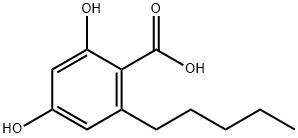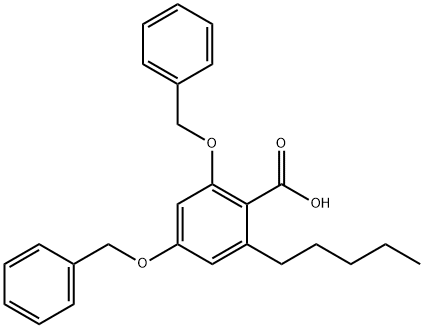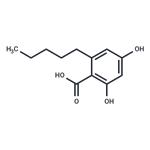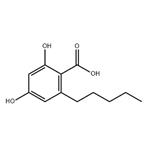Uses
Olivetolic Acid is a precursor in the synthesis of primin and tetrahydrocannabinol.
Definition
ChEBI: A member of the class of benzoic acids that is salicylic acid in which the hydrogens ortho- and para- to the carboxy group are replaced by a pentyl and a hydroxy group, respectively.
Biosynthesis
Olivetolic acid (OLA) biosynthesis involves the condensation of one hexanoyl-CoA with three malonyl-CoAs by a type III PKS (tetraketide synthase) OLA synthase (C. sativa OLS; CsOLS) and an OLA cyclase (CsOAC), both enzymes were derived from the Cannabis species (C. sativa). Studies have achieved trace amount of OLA production in both E. coli and S. cerevisia[1]. Ma et al. find that Pseudomonas sp LvaE encoding a short-chain acyl-CoA synthetase can efficiently convert hexanoic acid to hexanoyl-CoA. The co-expression of the acetyl-CoA carboxylase, the pyruvate dehydrogenase bypass, the NADPH-generating malic enzyme, as well as the activation of peroxisomal β-oxidation pathway and ATP export pathway are effective strategies to redirect carbon flux toward OLA synthesis.
References
[1] Ma, J, Y. Gu, and P. Xu . "Biosynthesis of cannabinoid precursor olivetolic acid by overcoming rate-limiting steps in genetically engineered Yarrowia lipolytica." Cold Spring Harbor Laboratory(2021).





